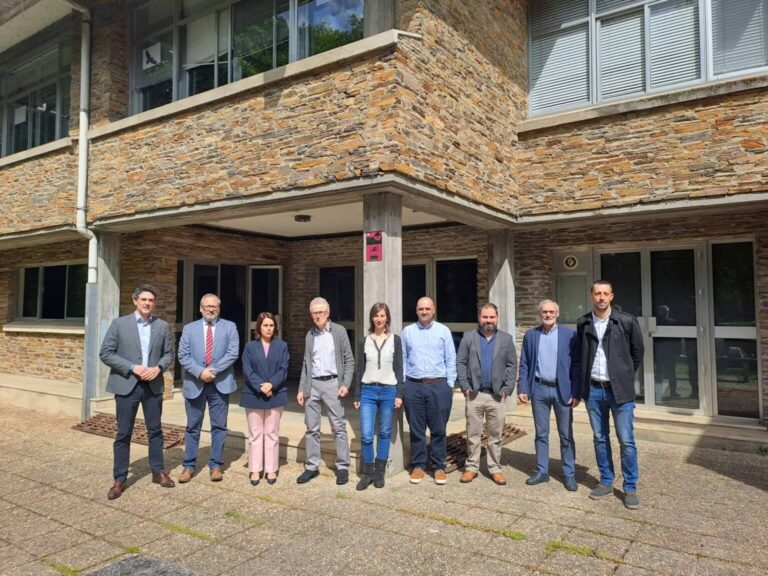This morning, the event to present the results of the R&D&I projects NANOFLUIDETEC and DIGITAL BIOCoV, within the framework of the CONECTA COVID 2021 programme, as part of the European Union’s response to the COVID-19 pandemic, was held in the Salón de Grados of the Faculty of Science in Lugo and in online mode through the Zoom platform.
In the case of NANOFLUIDETEC ‘Rapid and automatable detection for SARS-Cov-2 based on PCR, nanotechnology and microfluidics’, a multiviral RNA extraction kit manufactured entirely in Galicia using magnetic nanoparticle technology has been designed, developed and clinically validated. In parallel, an on-chip microfluidic system integrating extraction, RNA amplification and fluorescence has been developed, the use of which has been automated through the design and manufacture of a prototype combining magnetic transport, temperature control and optical detection of the signal. This automated device for the rapid diagnosis of SARS-CoV-2, which combines nanotechnology, loop isothermal amplification (LAMP) and microfluidics, is intended for point-of-care use, which is an advantage over current detection systems as it does not require skilled personnel.
The consortium that has carried out this research is made up of four Galician companies: Applied Mass Spectrometry Laboratory from Lugo; AMSbiopharma, a company belonging to the AMSlab Group, leader of the project and also located in Lugo; Bflow, based in Santiago de Compostela and the Lugo Campus of the University of Santiago de Compostela through the research unit of Fluorescence of Individual Molecules, which collaborated jointly for its execution.
DIGITAL BIOCoV ‘Early prediction of anti-COVID-19 activity on biomolecules present in fungi and microalgae through the application of Machine Learning techniques integrating biological and chemical data’, has laid the foundations for accelerated development for the discovery of new anti-COVID-19 drugs through prediction based on the combination of biological activity data and chemical analysis data, which could also be extrapolated to other diseases.
An existing collection of 150 fungi with proven medicinal potential, and more than 15 species of active compound-producing microalgae, have been used to develop fractions that have been subjected in isolation or in combination to in vitro anti-COVID-19 bioactivity studies and chemical characterisation in the laboratory. All these data (bioactivity and characterisation) have been integrated into an artificial intelligence tool from which we can extract greater knowledge of the composition and functionality of the samples tested, thus accelerating the stage of early drug discovery from natural products.
The consortium is also formed by 3 Galician companies: Hyphae da Terra, leader of the consortium and based in Pontevedra; Plexus Technology, located in Santiago de Compostela; the laboratories AMSbiopharma and CIFGA from Lugo, and also have the support of the University of Santiago de Compostela as a subcontracted company as a collaborating entity.
The event was opened by Patricia Argerey, Director of the Galician Innovation Agency, followed by the intervention of Asteria Luzardo, Dean of the Faculty of Science of Lugo and representatives of the companies that make up both consortia.
These projects are subsidised by the Galician Innovation Agency (GAIN), financed by ERDF funds and supported by the Xunta de Galicia through the second vice-presidency and the Regional Ministry of Economy, Enterprise and Innovation. The operation is funded through the CONECTA COVID 2021 programme under the REACT-EU axis of the Feder Galicia 2014-2020 operational programme, as part of the European Union’s response to the COVID-19 pandemic.

